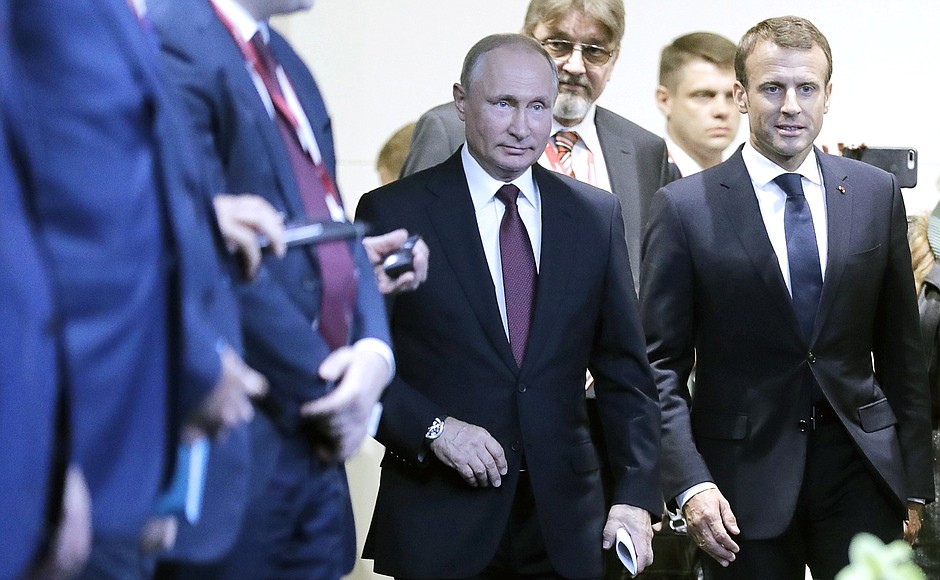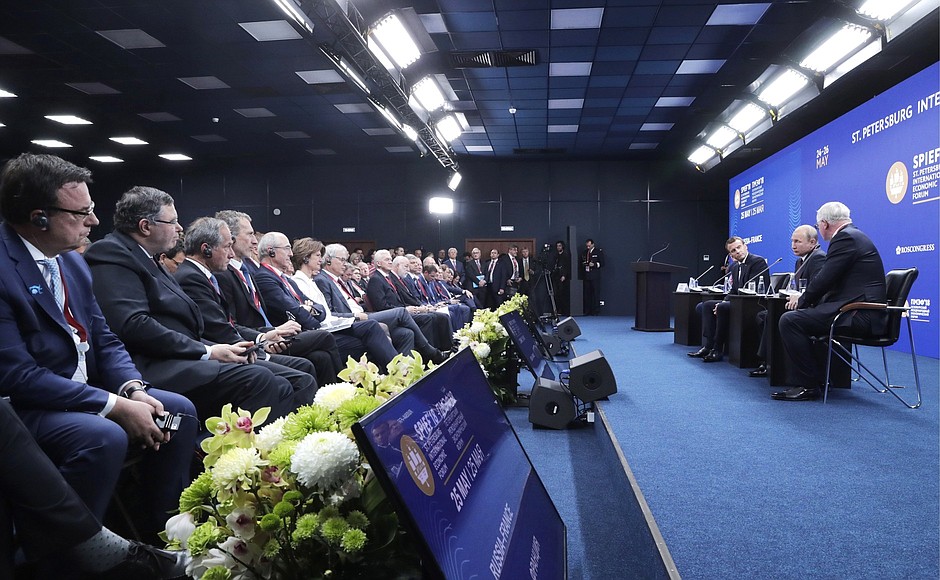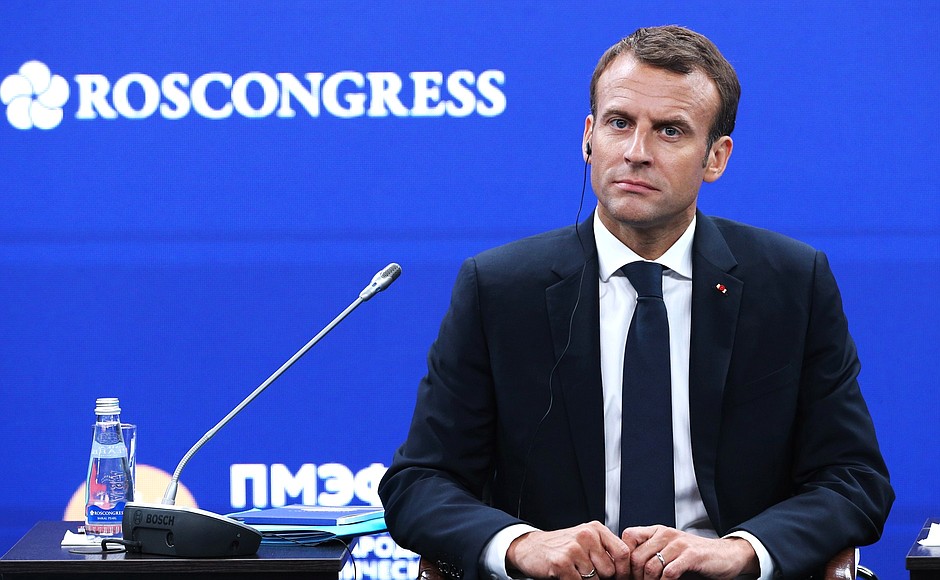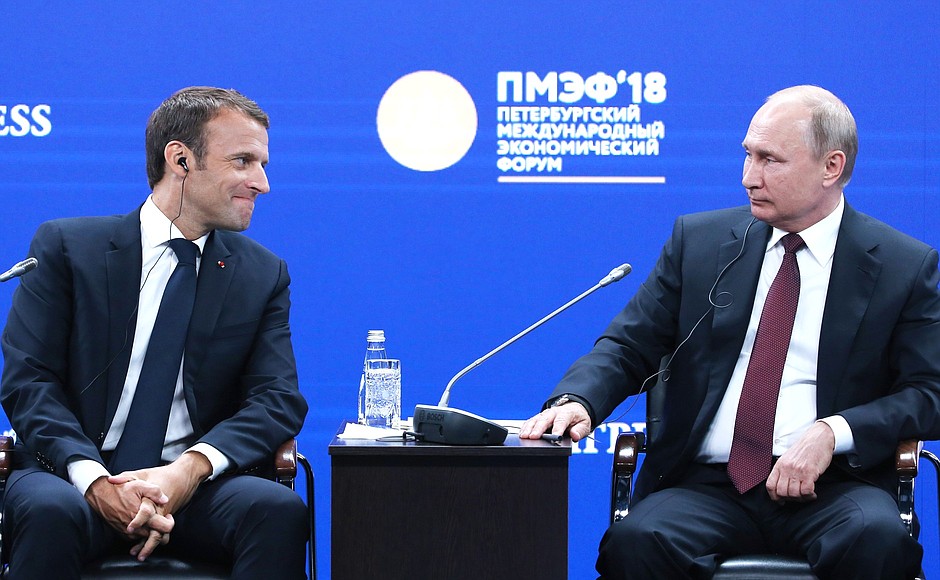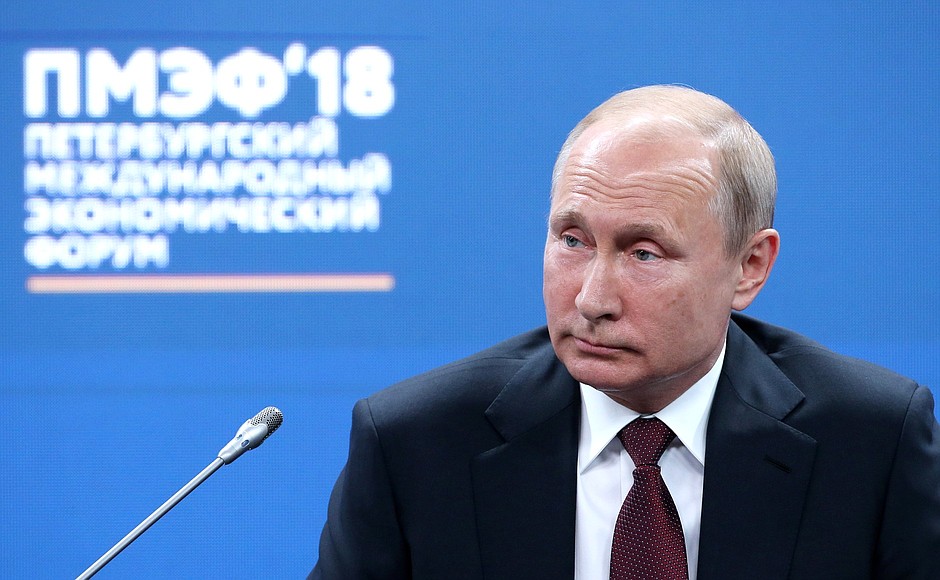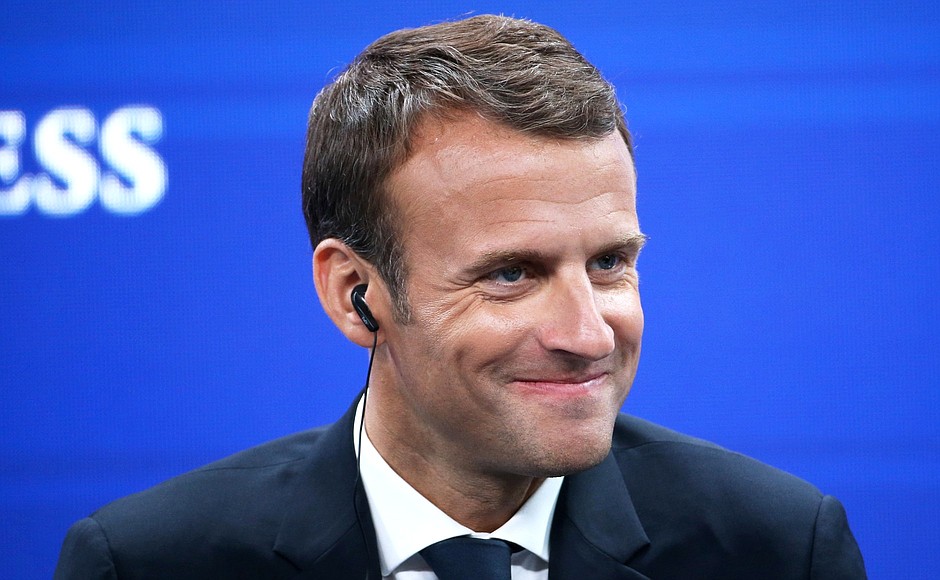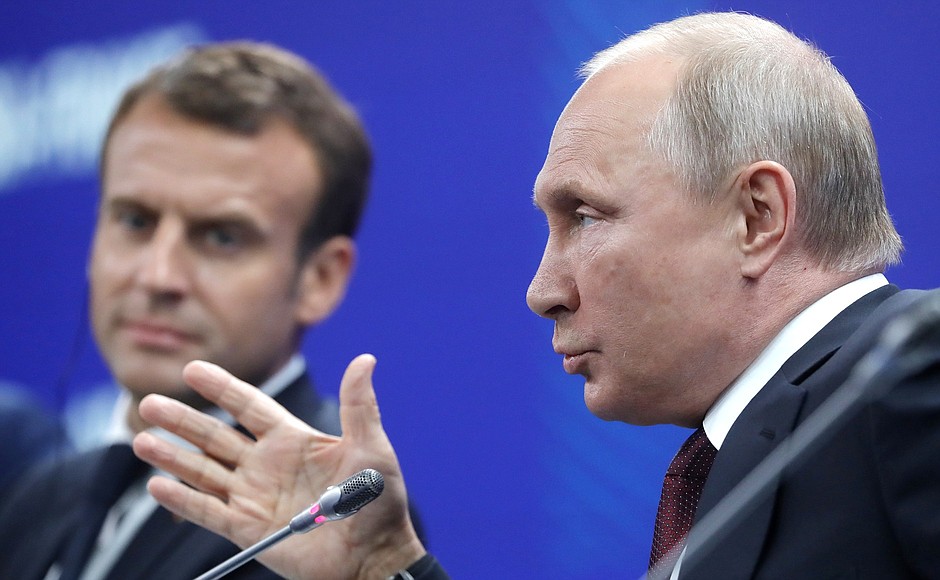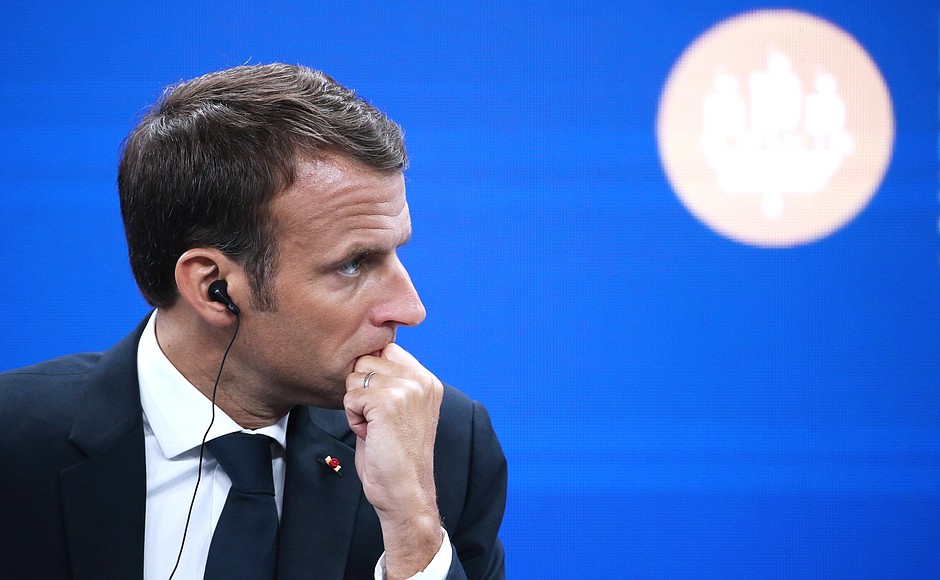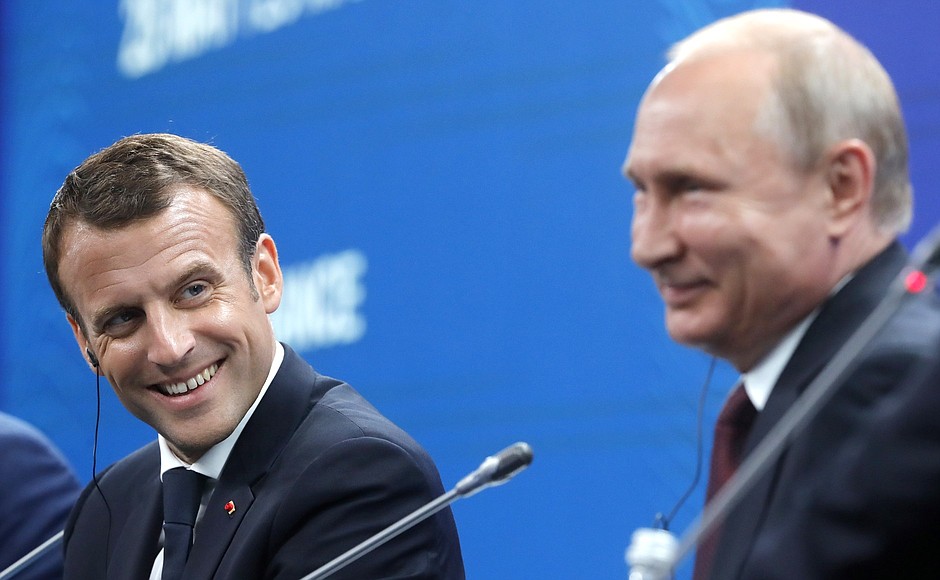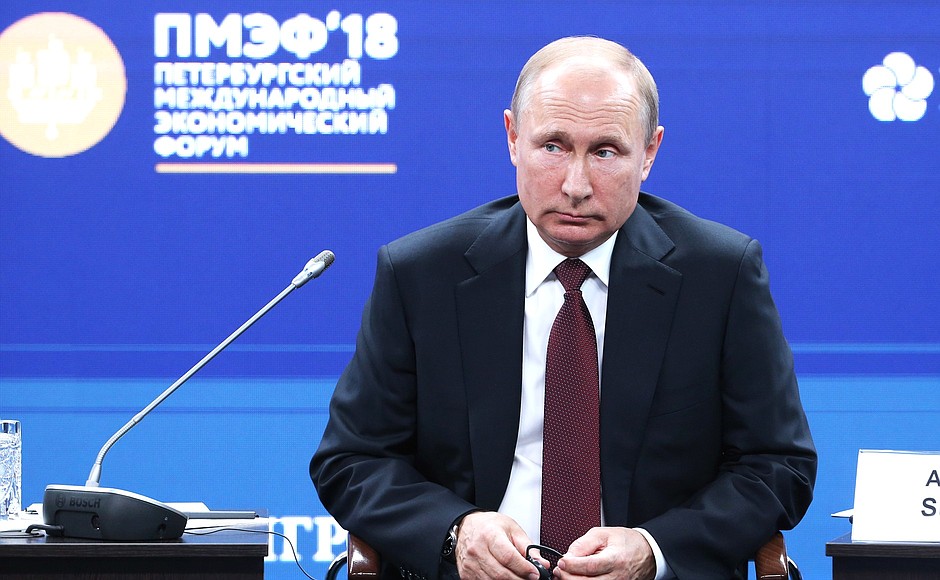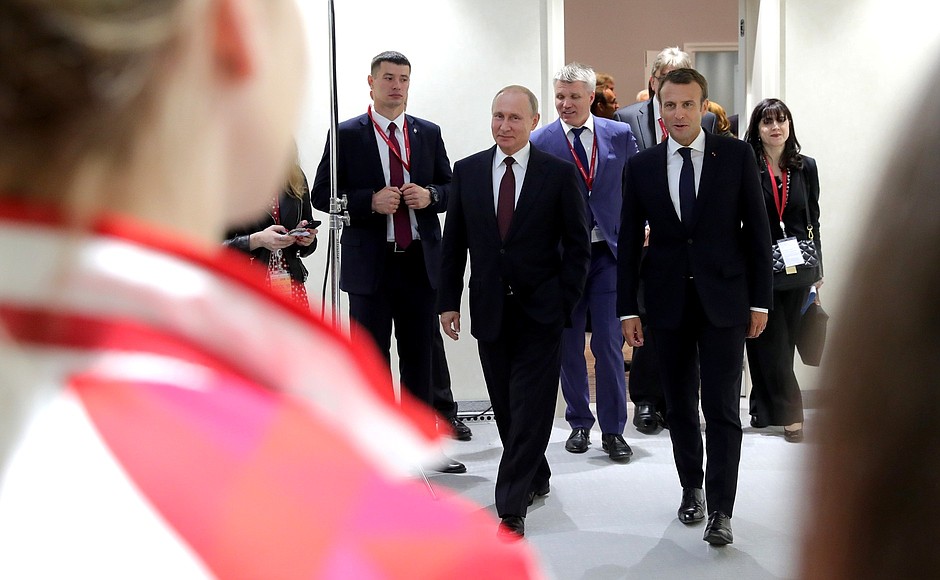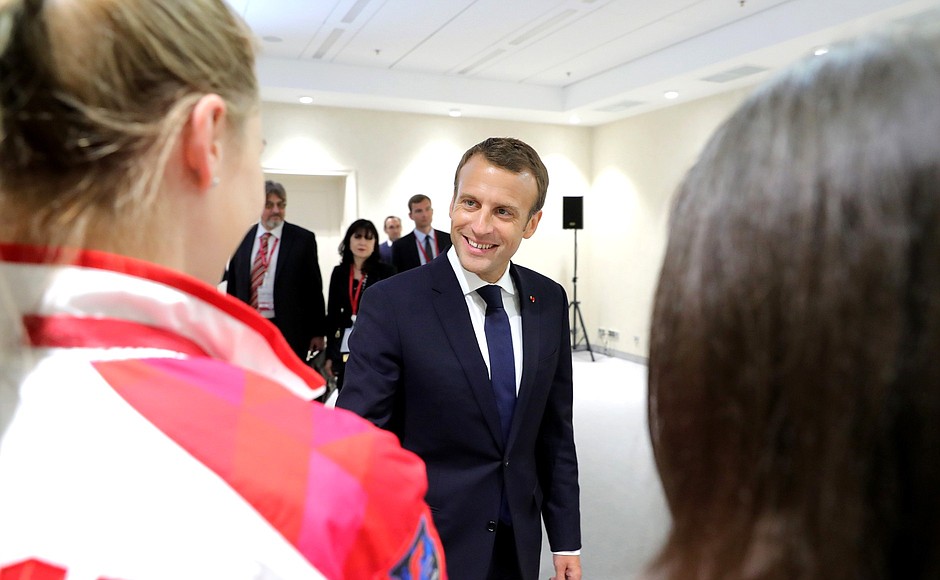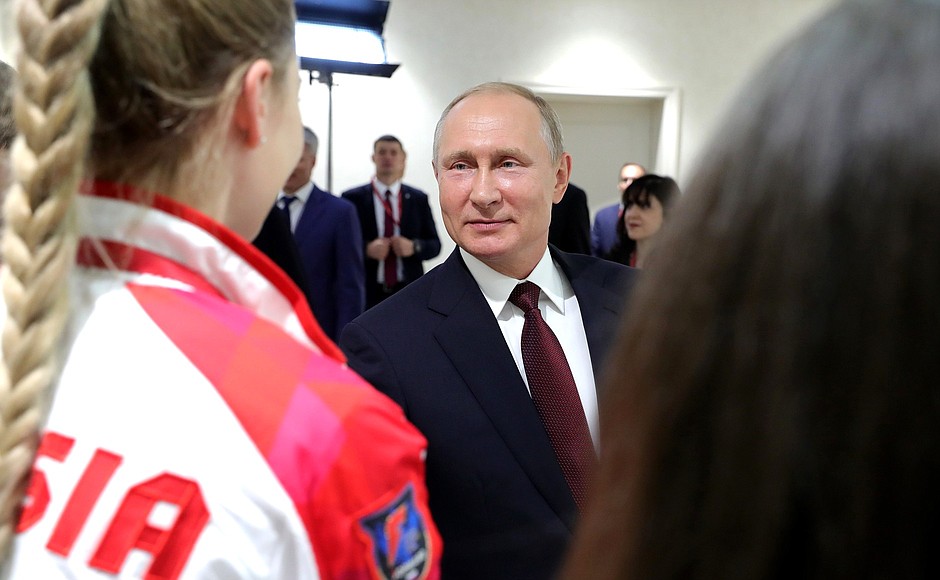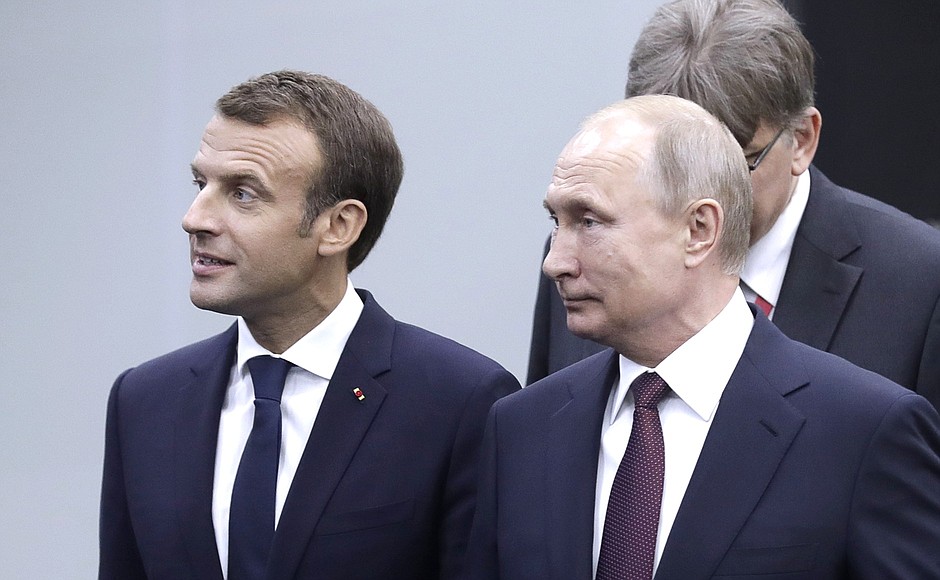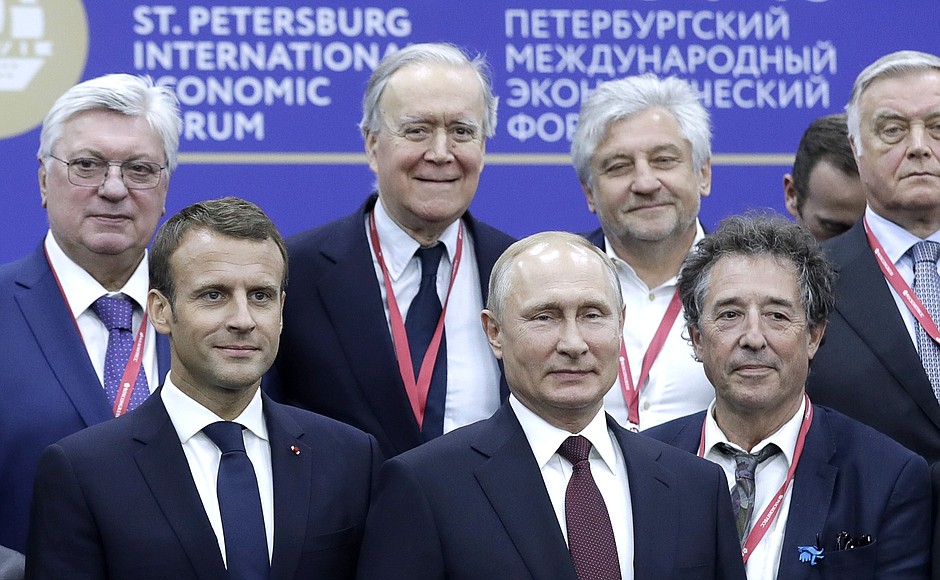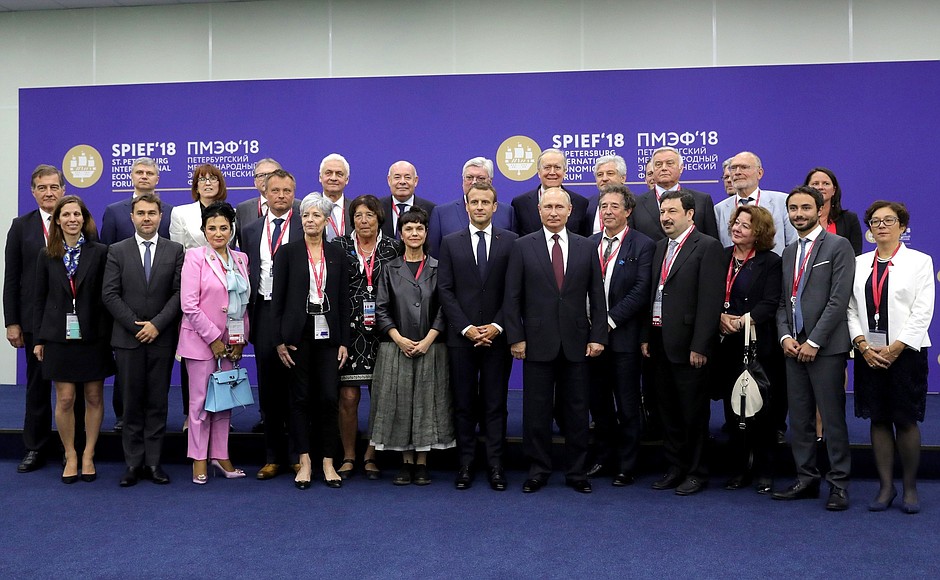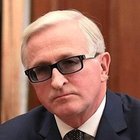The participants discussed Russia’s investment appeal for French business and new areas of mutually beneficial cooperation, in particular, in the digital economy.
Following the panel discussion, Vladimir Putin and Emmanuel Macron met with participants in a friendly match between Russian and French women’s national sabre teams held the day before as part of the sporting programme of the St Petersburg International Economic Forum. The Russian team won 45:44.
The two presidents also posed for a photograph with members of the Coordinating Council of the Trianon Dialogue civil society forum.
* * *
Excerpts from the Russia-France Business Dialogue panel discussion
President of Russia Vladimir Putin: To begin with, I would like to thank President Macron for coming to Russia and St Petersburg.
We had a very substantive discussion on international issues yesterday and a very open, meaningful and, I think very useful exchange on bilateral ties.
France is a traditional, old and reliable partner. I say that it is a reliable partner because France always took an independent stand on international affairs and always tried to at least uphold its sovereignty. We appreciate this.
It is especially important and highly valued today as an earnest of stability in relations. Overall, stability is what matters most in international affairs, as well as in interstate and economic ties.
Our relations with France are developing consistently and progressively. Our trade increased by 16.5 percent last year and by 25 percent in January-March 2018. As for investment, France’s direct investment has reached $15 billion, and Russia has invested around $3 billion, or more precisely, over $2 billion, which is not enough. But the French investment is not enough either.
I will disappoint Emmanuel: Germany is no longer our number one partner. China has long snatched first place in terms of investment and trade. Our trade with China is approaching $850 billion. Sorry, it is $86 billion. I would like to say that our trade with the EU used to be $450 billion, but it has plunged by half over the past few years, while our trade with China has grown. It has backslid a bit, but it is still growing consistently. It will definitely grow to $100 billion soon. Sorry, 850 billion was a slip of the tongue.
The same goes for investment. How much has Fortum invested in Russia, just this one Finnish company? Around $6 billion. One Finnish company has invested $6 billion, and the whole of France only $15 billion. Is this how it should be?
Yes, this is true. Fortum was the first company that came to mind. We gave this Finnish energy company a permit to work in Siberia, where it supplies energy to highly sensitive facilities, including nuclear ones. I would like to point out that the Russian economy is wide open to our partners and is very reliable, because we have attained macroeconomic stability despite the ongoing turbulence, which is important for our investors.
We were consistently working on targeting inflation and we made it. Last year we had a record low inflation rate of 2.5 percent. The Central Bank forecasts the inflation rate at 2.8 percent but our experts believe it will be a bit higher. Yet, this is still a sign of stability.
We purposefully reduced expenses – and not only owing to energy price hikes last year – and decreased the budget deficit from the expected more than three percent to 1.5 percent. This year we will have a surplus of 0.5 percent of GDP. The unemployment rate is also historically low, 5.1 percent.
All this is put together in a package: the national debt is less than 20 percent and our gold and currency reserves are growing – we had 430 billion at the beginning of the year, I believe, and now this is already 450 and 460 billion and the trade balance is positive at over 100 billion, 130 billion, I think. Put together, these figures create a platform for confident action, including joint action. We hope our French friends will develop their companies in Russia and make a profit.
Yesterday I met with the biggest investors in our economy. Some foreign funds took a fairly unprecedented step. They automatically invest together with our Direct Investment Fund into any project. When our fund invests money, our foreign partners follow suit because they trust it.
Of course, we realise that our task is to create attractive conditions for investment. This is a key area of our development. This is obvious and we are fully aware of this as well as the need to enhance labour productivity. Our job is to increase it by five percent per year. This is a very complicated thing to do, especially for our economy that we need to structure – an extremely complicated problem. But the road to this also lies through investment because through it we hope to achieve a cardinal change in the structure of the economy and make it innovative.
Mr Shokhin said that I got “infected” with digitalisation last year. But I am in great health, actually. (Laughter.) It is not that I was “infected,” but the global economy is “pregnant” with digitalisation. As we all know, there is nothing wrong with being pregnant. (Applause.) I think that the applause come from the ladies.
President of the Russian Union of Industrialists and Entrepreneurs Alexander Shokhin: Mr President, this is what Igor Shuvalov told us at one of the panel sessions. Now we know why he is no longer in the Government.
Vladimir Putin: Well, he did not go too far away. Mr Shuvalov will now work with the Government in one of Russia’s development banks. So he will have a lot to do.
I would like to follow up on what my French colleague said on urban development. This and spatial development in general are priority areas for us. Our French colleagues possess many world-class competences in this field. The President of France mentioned our cooperation in space. But there is much more to it.
I think that we had 15 or 17 space launches as of the end of 2017, and another two or three launches from Kourou are scheduled for this year. Let me remind you that we also cooperate in aircraft manufacturing. After all, the Russian medium-haul SuperJet 100 aircraft includes a significant share of French parts. I do not remember the exact figure, but it is at least 25 percent. We are already selling this aircraft to third countries, while we all know that this is a very challenging business, and how hard it is to promote aviation products on the global markets. We also work in the pharmaceuticals industry and construction. All in all, there are many things we do together.
It is particularly good that Russia has developed a diversified relationship with its French partners. This diverse mix can pave the way to success moving forward.
Mr Macron talked about the need to enhance economic sovereignty, but this is relevant for the entire world. I will not go into details right now, and I will not point fingers or criticise anyone. This is not the reason we gathered here today. It is clear however that we need to work on the capacity of our own markets, and promote cooperation and integration. We need to resist the trend of markets becoming secluded from one another, because separatism, be it in the economy or any other kind of separatism, always means trouble.
We have all it takes to step up cooperation and achieve positive results without trying to oppose anyone. There is no doubt that in this case both France and Russia would stand to benefit.
Thank you very much for your attention.
<…>
Vladimir Putin: (Commenting on the questions from Total CEO Patrick Pouyanné.) Patrick indeed raised a few questions. The first one was in fact a question about improving the business climate. We are getting there; we have a whole programme for that. I hope it will be implemented. I already spoke about stability of the macroeconomic policy. We will achieve the same in taxation policy.
Now the Government is working on introducing certain changes to the taxation system. But once we are done, we will commit to it for the next six years. In that respect, businesses can be sure that the taxation terms will be observed.
Then we will develop infrastructure. Patrick himself just recalled that we built a port [for the Yamal LNG project] with businesses’ participation; however, the Government met its commitments in full. We will develop the infrastructure not only for this project but for others as well – and the infrastructure in general – because the infrastructure is one of the priorities outlined by me in my Address to the Federal Assembly and by the Government. After that, we will be reducing administrative barriers and administrative pressure on businesses. There is still work to do in this area. In fact, this is not only our problem. I know that businesses have to deal with it in many countries.
And finally, direct financial support and concessions for the projects that, we believe, are of national importance. These are the areas of focus.
Now, concerning Yamal LNG. Indeed, they built an entire city around it. I was greatly impressed, also because, frankly speaking, in the very beginning there were many sceptics, even in our country, even in the gas industry, who doubted that it would be possible to carry out such a large project at those latitudes. But along with our Russian partners, along with NOVATEK, along with Chinese partners, we managed to make it a reality. Total has a 20-percent share in it. I know that the second stage is about to be built. For now, the annual capacity is 16.5 million tonnes. I think it will soon be 18 million. Their LNG is sold all over the world, including the US market. Everything is fine, everybody is buying it, everything works.
As regards our gas pipeline projects, specialists in this field know that in some cases it is reasonable to implement liquefied natural gas projects – for instance, supplies to the United States, India and other remote markets; it is most reasonable to implement them through liquefied natural gas projects. With certain distances and supplies, it is only pipeline gas that is most profitable. This is why all our gas pipeline networks are connected to main customers in Europe and have practically no competitors – of course, as long as Europe wants to stay competitive and does not want to purchase gas at triple the price from other producers.
The thing is that production and supplies for such distances and with such volumes allows us to reduce prices for liquefied natural gas, which could technically be supplied from the United States, by at least 30 percent. Numerous liquefied gas handling terminals have already been built in Europe and only 25 percent of their capacity is being used as the rest is economically impractical. That is all.
As far as I know, the French company Engie takes part in Nord Stream 2. We will welcome other participants, including Total. We can expand this list by adding other European companies, because this is truly a pan-European project.
We know that it is being opposed, but mostly for the reasons of competition because our American partners want to supply their gas to Europe. I have already said how the economic parameters of these supplies correlate. There are also geopolitical issues involved, in particular, transit across Ukraine. I will once more repeat that we are not going to cut transit via Ukraine as long as it is economically feasible; we are ready for talks with our Ukrainian partners.
But the thing is that when we talk about the Nord Stream 2 project, we are talking about plummeting production in Europe, the Netherlands and Great Britain. And these shortfalls in volume must be substituted. The most right and economically feasible substitution option is Russia's pipeline gas, that is all. But we are ready to further discuss it with our partners.
Thank you very much.
<…>
Vladimir Putin: Not to sound impolite, but Patrick asked another question on transporting gas to Europe through pipeline systems, speaking of your current Russian partners, and this can be done today via Gazprom Export. (Laughter in the audience). What is funny about it? Nothing. (Addressing Emmanuel Macron) Sorry, we are speaking a kind of secret language with him, we understand what we are talking about.
But of course, we will think about liberalisation. Today, Nord Stream 2 involves five European companies. If Total is the sixth one, it will be welcome to directly participate in the transportation. We can talk about it and discuss it now. Sooner or later, it will be done in a totally liberal mode.
Nevertheless, we can discuss these issues today.
